|
|
|
Sort Order |
|
|
|
Items / Page
|
|
|
|
|
|
|
| Srl | Item |
| 1 |
ID:
151000
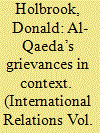

|
|
|
|
|
| Summary/Abstract |
At a time when political debate in the West is preoccupied with the perceived impact of extremist ideas on individuals who embrace or support terrorism, this article uses the publicly articulated grievances of Ayman al-Zawahiri, Al-Qaeda’s most prolific ideologue, as a case study to examine how a globally focused and distributed extremist narrative matches political realities on the ground. The approach of the article is to compare two political processes: the approach of Islamist extremists, as represented by Zawahiri, to constitutional reform as articulated through public appeals to potential supporters versus the reality of constitutional amendments and evolution of fundamental law in the Middle East and South Asia. Incorporating insights from studies on law and society and International Relations, the article demonstrates how Zawahiri’s interpretation of religious law emphasises wholesale adoption of sharia while the process of legal reform has invariably resulted in the creation of legal hybrids, mixing Islamic and non-Islamic legal traditions. This is not an article about theology or religious law but an effort to dissect the public relations of an international terrorist movement. The analysis pays particular attention to events in Zawahiri’s native Egypt, where evolving grievances concerning a series of constitutional amendments – including those following the Arab revolutions and the toppling of Mohammed Morsi – are assessed.
|
|
|
|
|
|
|
|
|
|
|
|
|
|
|
|
| 2 |
ID:
194803


|
|
|
|
|
| Summary/Abstract |
What explains the emergence of al-Qaeda and the Islamic State as parties in civil wars? This study provides the first large-N analysis of this question, studying a sample of states in Africa, the Middle East and Asia, 2003–2020, contributing to ongoing debates among peace and conflict scholars about jihadist rebels in civil war. Theoretically, it is argued that higher levels of state repression and states’ military capabilities should impact the preferences of local groups and increase the likelihood of a ‘transnationalization’. On the other hand, it is hypothesized that increases in bureaucratic state capacity should reduce the risk of such transnationalization. A series of penalized logistic regressions yield support for the hypotheses regarding state repression and bureaucratic capacity, but not military state capacity. The findings point towards the importance of bureaucratic capacity building as well as the potentially adverse consequences of excessively repressive counterterrorism strategies.
|
|
|
|
|
|
|
|
|
|
|
|
|
|
|
|
| 3 |
ID:
139119
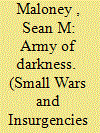

|
|
|
|
|
| Summary/Abstract |
The current Islamic State in Iraq and Syria displays both Taliban and al Qaeda-like characteristics. We can expect IS to host international jihadists in the same way the Taliban did between 1996 and 2001. This study depicts the jihadist training and support network established in Afghanistan during those years prior to its dismantlement and exploitation by Operation ENDURING FREEDOM. Up to now this system was understood only in the abstract but with newly available information, the scope and scale of the international jihadist project in Afghanistan can be unveiled.
|
|
|
|
|
|
|
|
|
|
|
|
|
|
|
|
| 4 |
ID:
157798
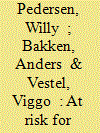

|
|
|
|
|
| Summary/Abstract |
Little is known about attitudes among ordinary adolescents in favour of the use of political violence and radicalization. We draw on a survey from a population sample of adolescents (n = 8627) in the Norwegian capital, Oslo. We first compared adolescents with Muslim, Christian and no religious affiliation with regard to attitudes in favour of the use of violence for political purposes and support of those who go to Syria to take part in active combat. Muslim youth reported higher levels of support for the use of violence to obtain societal change than did other adolescents. The same pattern was revealed with regard to support for the fighters in Syria. After control for other variables, Muslim affiliation had no impact on attitudes in favour of politically motivated violence, though it remained significant for support for the fighters in Syria. However, here as well we found associations with poor school grades, conduct problems and exposure to violence, possibly indicating an emerging adolescent ‘outsider’ position. Political activity on social media also played a role. Such attitudes rarely develop into politically motivated violence and jihadism. However, for a small minority, they may represent the first step in that direction.
|
|
|
|
|
|
|
|
|
|
|
|
|
|
|
|
| 5 |
ID:
147717
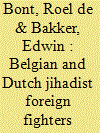

|
|
|
|
|
| Summary/Abstract |
In recent years, Belgium and the Netherlands have been confronted with relatively many citizens or residents who have traveled to Syria and Iraq to join and fight with jihadist groups — 388 Belgian and 220 Dutch as estimated by the respective authorities. This article provides an overview of the phenomenon of jihadist foreign fighters in the Low Countries, analyzing their characteristics, motivations, and roles in the war in Syria and Iraq. It compares the Belgian and Dutch cases, focusing on key aspects, such as age, sex, and geographical and socioeconomic background.
|
|
|
|
|
|
|
|
|
|
|
|
|
|
|
|
| 6 |
ID:
180622
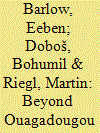

|
|
|
|
|
| Summary/Abstract |
The article evaluates the current worsening security situation in Burkina Faso and ties it to a lack of state-building in the country. Based on Tilly's approach to state-building, it, consequently, draws a set of recommendations aiming to strengthen the effectiveness of Burkinabe security forces as a primary step to stop the current wave of violence and establish more stable state institutions. These would become a first step of the process that is necessary to stabilise the situation in the region, enhance the Pillars of State, and allow the state institutions to overcome the militias. The article clearly states that foreign intervention and military solution only of the conflict cannot lead to a successful result. Burkina Faso needs to enhance institutional penetration throughout its territory to allow for the mitigation of the rebellions not only in this instance but also for the future and strengthen the state-building project.
|
|
|
|
|
|
|
|
|
|
|
|
|
|
|
|
| 7 |
ID:
153872
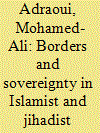

|
|
|
|
|
| Summary/Abstract |
This article explores how Islamists and jihadists have framed issues pertaining to sovereignty, borders, as well as political and religious identity, over the last century. At a time when the territorial delimitations of several Arab countries seem more fickle than ever, it is necessary to address how Islamists and jihadists view the historical and contemporary aspects of borders and sovereignty. The Islamists, on the one hand—whose aim is creating a caliphate—have had to deal with unexpected realities, turning inevitably to some extent of reform of their original revolutionary ambition. The jihadists, on the other hand, while remaining committed to an armed struggle to unify Muslims worldwide, do not advocate for any action other than global insurrection. By focusing on the writings and discourses of major Islamist and jihadist leaders, it thus appears that the study of borders and sovereignty is indispensable to understanding the similarities and differences between the two ideologies. In addition, the study of borders and sovereignty allows for predicting developments in the region that largely pertain to the desire to achieve (jihadists) or amend (modern Islamists) the original revisionist design. It appears that borders, territory and sovereignty prove to be significant constraints for both Islamists and jihadists. Evidently, both Islamists and jihadists have reacted in diverging ways to the political and cultural realities that stand against their founding ideology—with certain Islamist movements having thus nationalized their doctrine, while jihadists still remain eager to achieve their original ambition.
|
|
|
|
|
|
|
|
|
|
|
|
|
|
|
|
| 8 |
ID:
183464
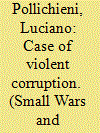

|
|
|
|
|
| Summary/Abstract |
This article provides a new perspective on the logic of violence of the JNIM in the context of the Malian civil war. After a critical review of the literature on the Malian conflict, this article will apply Benjamin Lessing’s model on the logic of violence in criminal wars to JNIM. Through the adoption of Lessing’s model, this article will demonstrate how JNIM’s insurgency can be considered as a case of violent corruption in the context of a war of constraint. Combining qualitative and quantitative methods, this paper will show firstly, how the Malian civil war should be conceived as a war of constraint rather than a war of conquest; secondly, how JNIM is using violence in order to restrict the implementation of the rule of law in some regions which are strategic also for its financing activities. By adopting this new framework, it will be possible to overcome some conundrums characterising the debate on the Malian insurgency and to highlight some relevant topics for future research.
|
|
|
|
|
|
|
|
|
|
|
|
|
|
|
|
| 9 |
ID:
126288
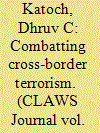

|
|
|
| 10 |
ID:
099654
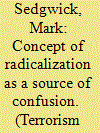

|
|
|
|
|
| Publication |
2010.
|
| Summary/Abstract |
The ubiquity of use of the term "radicalization" suggests a consensus about its meaning, but this article shows through a review of a variety of definitions that no such consensus exists. The article then argues that use of the term is problematic not just for these reasons, but because it is used in three different contexts: the security context, the integration context, and the foreign-policy context. It is argued that each of these contexts has a different agenda, impacted in the case of the integration agenda by the rise of European "neo-nationalism," and so each uses the term "radical" to mean something different. The use of one term to denote at least three different concepts risks serious confusion. The proposed solution is to abandon the attempt to use "radicalization" as an absolute concept.
|
|
|
|
|
|
|
|
|
|
|
|
|
|
|
|
| 11 |
ID:
172185
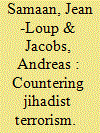

|
|
|
|
|
| Summary/Abstract |
As France and Germany have become major targets of jihadist terrorism, the calls for stronger cooperation in counterterrorism at the European level have grown in earnest. However, a comparative analysis of the national experiences from both countries evidences significant differences in terms of political culture, institutional division of labor, and legal oversight. Counterterrorism practices can be described following a typology of three broad categories: a military-oriented policy that aims to prevent, deter and retaliate against terrorists; a regulatory policy that strengthens the legal and judicial resources to address the terrorist threat; a diplomatic approach that focuses on negotiations, and sometimes accommodation. Whereas France moved after the 2015 attacks towards a military-oriented policy, Germany has so far opted to sustain its traditional regulatory approach. This article details the differences between Paris and Berlin regarding the contemporary public debate on jihadist terrorism, to the law enforcement framework, to the deradicalization programs as well as to the role of armed forces. The paper identifies a clear divergence in each of these sectors. As the future extent of bi- and multilateral lateral efforts in the field of counterterrorism are likely to rise, these differences should be better taken into account.
|
|
|
|
|
|
|
|
|
|
|
|
|
|
|
|
| 12 |
ID:
170631
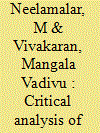

|
|
|
|
|
| Summary/Abstract |
Jihadism’ (also known as the jihadi movement) is a popular term that signifies the Islamic terror movement which thrives on extremist ideologies and violence. In addition to the conventional practices, the online medium is currently being employed for disseminating these extremist ideologies across the globe. Radicalisation and recruitment of geographically dispersed individuals as ‘jihadists’ for supporting Islamic terror activities tend to be the primary intent for using the digital platforms as the medium of communication in this context. One such initiative by the Lashkar-e-Taiba of Jammu and Kashmir was the release of the ‘Wyeth: The Resistance in Flow’, an e-magazine which was launched on April 2018. The first issue which was posted with an open access option was primarily designed to influence the Indian youth population through the radical interpretations of Islam. Hence, it is crucial to analyse and understand the jihadi discourse of the Wyeth magazine in order to curb and counter-attack such initiatives at its initial phase. For this purpose, the present study aims to examine the content of the Wyeth magazine and analyse the basic traits of the jihadi propaganda and its potential to aid in the self-radicalisation process.
|
|
|
|
|
|
|
|
|
|
|
|
|
|
|
|
| 13 |
ID:
095176
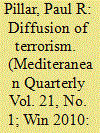

|
|
|
|
|
| Publication |
2010.
|
| Summary/Abstract |
The prevailing perception of the threat from international terrorism is that it emanates chiefly from one group, al Qaeda, it is tied to a territorial presence in South Asia, and it is driven by a fixed ideology bent on inflicting maximum damage on the West. The perception stems more from Western fears and the legacy of past experience than from actual trends in terrorism. The real threat is more diffuse and decentralized, not embodied in any one group or piece of territory, and has more malleable goals and tactics.
|
|
|
|
|
|
|
|
|
|
|
|
|
|
|
|
| 14 |
ID:
080369


|
|
|
|
|
| Publication |
2007.
|
| Summary/Abstract |
Over the last few years, Moroccans have been disproportionately involved in jihadist terrorism. Morocco has been increasingly identified as one of the largest producers of terrorists and insurgents in Afghanistan, Iraq, and throughout Europe. This article examines the factors behind the emergence of jihadist terrorism in Morocco, and how this terrorist threat has gone beyond this country's borders. Three factors have contributed to this development: the influence of global jihad on potential Moroccan jihadists; the growing Islamization of the country; and deteriorating socioeconomic conditions. In analyzing these variables, special attention will be paid to the Casablanca terrorist attacks on May 16, 2003, marking the debut of suicide terrorism in Morocco. The article will also examine the principal counterterrorist initiatives Morocco has implemented in response to this threat.
|
|
|
|
|
|
|
|
|
|
|
|
|
|
|
|
| 15 |
ID:
181085
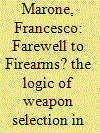

|
|
|
|
|
| Summary/Abstract |
In the vast literature on terrorism the choice of weapons has received relatively limited attention, despite the importance and visibility of this topic. Building on the literature on innovation in terrorism, the article first proposes a multi-level analytical framework that helps study terrorist weapon selection. It then investigates the use of weapons in jihadist attacks in Europe from 2014, with the rise of the so-called Islamic State, until 2020, based on an original database. The empirical analysis shows that the two traditional types of weapon of modern terrorism, firearms and explosives, were largely replaced by more primitive tools like melee weapons. In fact, in recent years jihadist terrorists in Europe have become less technologically advanced. Based on the original analytical framework, the article examines the reasons of this evolution, paying special attention to the use of the most common type of weapon in the database, bladed weapons, and the most lethal type, firearms.
|
|
|
|
|
|
|
|
|
|
|
|
|
|
|
|
| 16 |
ID:
191008
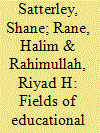

|
|
|
|
|
| Summary/Abstract |
This article contributes to our understanding of Islamist extremism by examining the relationship between early educational interests and ideas associated with Islamist-jihadist ideology. The article uses data collected through the Islam in Australia survey and specifically compares STEM (science, technology, engineering and mathematics) with HSS (humanities and social science) fields of educational interest in relation to respondents’ identification with political Islamist and militant typologies, identification with Islam as a political system, understandings of jihad and views on the caliphate as an Islamic religious obligation. The article found Muslim Australians who expressed an interest in STEM fields at high school were more likely than those interested in HSS to: (1) identify with the political Islamist and militant typology; (2) believe Islam advocates a political system; (3) believe establishing a caliphate is a religious obligation; and (4) define jihad as defensive and offensive rather than as defensive only. As discussed in the article, these findings support those of other research), which have identified an overrepresentation of STEM and an underrepresentation of HSS among Islamist-jihadists. This article adds weight to the assertion that the mindset of Islamist-jihadists, may be present prior to undertaking tertiary education and may predispose some to support extremist ideologies. This paper finds that an Islamist-jihadist ideological orientation has a relationship with the STEM fields broadly and Islamic studies specifically during adolescence.
|
|
|
|
|
|
|
|
|
|
|
|
|
|
|
|
| 17 |
ID:
087761
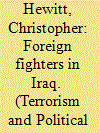

|
|
|
|
|
| Summary/Abstract |
Statistics on the national origin of almost one thousand killed and captured foreign fighters in Iraq reveal noticeable differences among Muslim majority countries in their jihadism rate (number of fighters/million population). These cross-national differences are used to test different theories as to the causes of Islamist extremism. The findings do not support those theories which see the cause of jihadism in the political and economic failures of Muslim societies, since the foreign fighters come from the more developed countries. The foreign fighters also come from the more religious societies, and from those societies "occupied" by U.S. or Israeli military forces.
|
|
|
|
|
|
|
|
|
|
|
|
|
|
|
|
| 18 |
ID:
184182
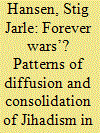

|
|
|
|
|
| Summary/Abstract |
The article will discuss the patterns that jihadism has followed when spreading throughout sub-Saharan Africa, addressing the major scholarly debates but also to bring forward the elements that various African cases seemingly have in common. The discussions over African Jihadism has seen several great debates, over the ungoverned space theory, a dichotomous discussion of the local and the global as opposing explanatory models, and a discussion of the role of ‘greed’ and economic incentives. The article argues that these discussions need to be transcended, and that dichotomous discussions fail to see more complex patterns of interaction between various factors, and the complexity of social relations that at times depend on the different contexts we study. Understanding how global networks can harness local conflicts to gain support is key to understanding African jihadist groups, and how those harnessing strategies can be limited. The article also suggests that there is an emerging consensus over several of the factors that do occur in sub-Saharan African jihadism and present the implications of these findings for the ongoing conflict in Mozambique and Tanzania.
|
|
|
|
|
|
|
|
|
|
|
|
|
|
|
|
| 19 |
ID:
180658
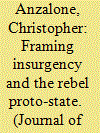

|
|
|
|
|
| Summary/Abstract |
This article traces the foundations, development, and evolution of Al-Shabaab’s multi-tiered media and information operations through a historical lens from proto and early Al-Shabaab media in 2006 and early 2007 up to the beginning of 2021. Arguing that the group’s media campaign is an integral part of its broader proto-state governance operations and kinetic actions, the article pays particular attention to central narrative frames aimed at domestic Somali, regional East African, and international audiences – both friendly and non-friendly – as well as to the role of media and information operations as part of the group’s domestic governance operations.
|
|
|
|
|
|
|
|
|
|
|
|
|
|
|
|
| 20 |
ID:
147716
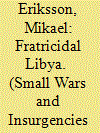

|
|
|
|
|
| Summary/Abstract |
This study explores the development of Libya’s security situation following the so-called Arab Spring in 2011 up to March 2016. It provides an overview of Libya’s main warring parties and the struggles they are engaged in. The analysis covers both domestic groups and the main external stakeholders. The study finds that the security dynamics are changing quickly and that Libya has many political hurdles and security challenges to overcome before a more durable situation of stability can be achieved.
|
|
|
|
|
|
|
|
|
|
|
|
|
|
|
|
|
|
|
|
|